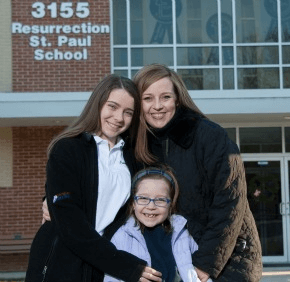ezygmont@CatholicReview.org
Twitter @ReviewErik
“I think it’s the academic excellence but also the values,” said Karen Murphy, principal of Resurrection-St. Paul School in Ellicott City, adding that “Catholic” can never be separated from those values.
“We don’t apologize for it, but we teach that Catholic is universal,” she said. “We teach the Catholic faith without making any kids feel left out.”
Catholics and non-Catholics alike appreciate Resurrection-St. Paul’s Values First program, according to Murphy, which integrates 13 values – hard work, concern for others and courage among them – across the curriculum.
Approximately 13 percent of the students enrolled at Resurrection-St. Paul are from non-Catholic families, Murphy said.
“We were looking for a school environment that pretty much matched and supported the beliefs and values we teach at home,” said her mother, Angela Fenton, adding that her family is Christian.
“(Resurrection-St. Paul School) has a very strong academic program, and at the same time they offer a very strong Catholic education,” Fenton added. “When it’s time for Mass or religion classes, they’re very welcome to everyone.”
Also see:
Catholic school students go to great lengths to serve
School of the Incarnation celebrates 10 years of “Giving Back”


